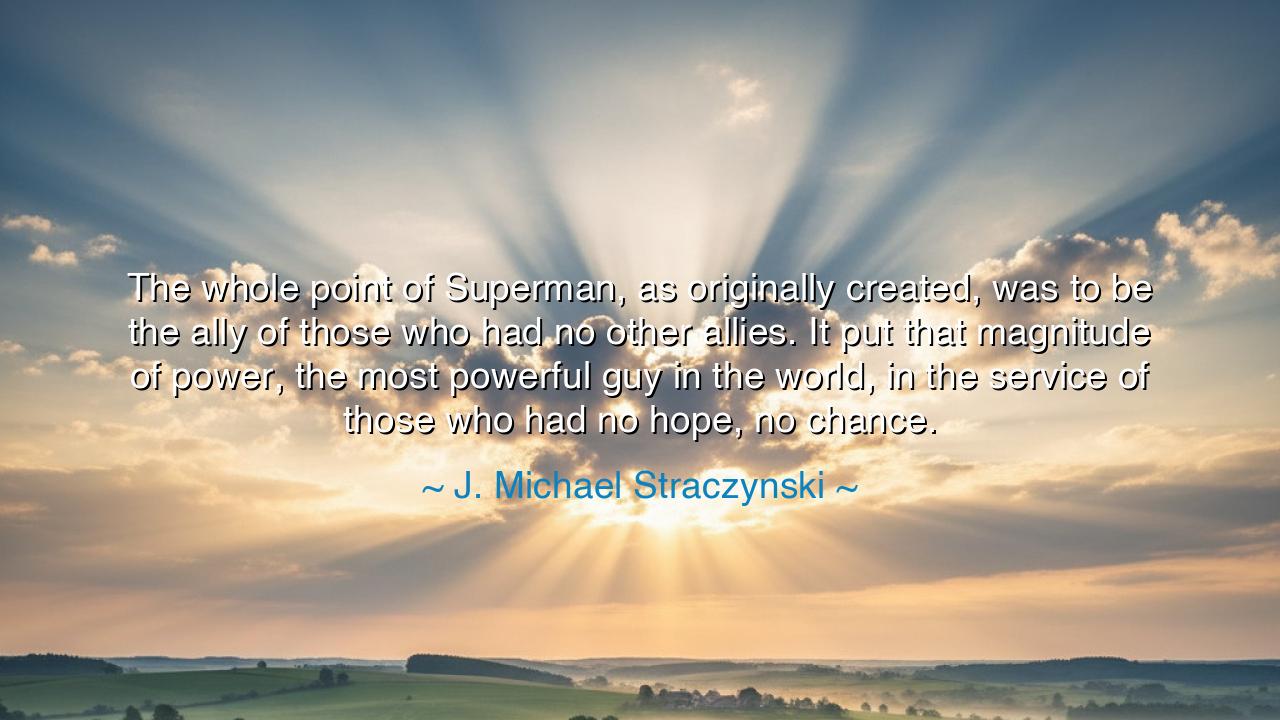
The whole point of Superman, as originally created, was to be the
The whole point of Superman, as originally created, was to be the ally of those who had no other allies. It put that magnitude of power, the most powerful guy in the world, in the service of those who had no hope, no chance.






In the vast tapestry of mythology and storytelling, few figures stand as tall as Superman, the hero whose very essence embodies the power and purpose of hope. The words of J. Michael Straczynski remind us that the true essence of this legendary figure is found in his role as the ally of the powerless, the defender of those who have no other protector. “The whole point of Superman, as originally created, was to be the ally of those who had no other allies. It put that magnitude of power, the most powerful guy in the world, in the service of those who had no hope, no chance.” These words carry the weight of a profound truth: that true power is not measured by dominance or control, but by the service it offers to those in need.
When Superman was first conceived, during the darkest days of the Great Depression, the world was in desperate need of a symbol. A world ravaged by poverty, injustice, and suffering cried out for a figure who could rise above the struggles of men and offer hope to the helpless. And thus, from the minds of two young creators, Jerry Siegel and Joe Shuster, Superman was born — not as a mere being of brute force, but as a symbol of justice, a protector of the voiceless. His power, vast and immeasurable, was not for conquest, but for protection. He stood as the last line of defense for the downtrodden, the oppressed, and the forgotten. His might, in this light, was not a weapon of oppression, but a shield for those who had no other ally.
In this, we see the essence of the ancient wisdom of the heroic archetype. From the earliest stories of Gilgamesh to the great epics of Homer, heroes were not simply warriors who sought personal glory, but protectors of their people, defenders of the weak, and champions of the right. The Hercules of myth, for example, was tasked not with achieving personal greatness but with completing the labors that would bring benefit to the wider world. In these stories, the hero’s strength is never about the power they wield, but the purpose for which that power is used. This is the very essence of Superman — his strength is a tool for the greater good, a means of standing against tyranny, and offering hope where none existed.
Consider also the story of Gandhi, who, though a man of humble stature, wielded immense moral power against the forces of imperialism. Like Superman, Gandhi did not use force or violence to achieve his ends. Instead, he put his strength into the service of the oppressed, advocating for the downtrodden and giving a voice to those who had none. His power, though not of the physical kind, had a magnitude far greater than any weapon. His leadership became a shield for the helpless, just as Superman’s invulnerable body is a shield for the helpless in the world of fiction.
It is, then, in the spirit of this sacrifice and service that we must understand Superman's true purpose. His heroism lies not in his strength, but in the selflessness with which he uses it. Unlike many who seek power to elevate themselves, Superman’s gift is that he sacrifices his personal desires to protect the greater good. His loyalty to the vulnerable, the marginalized, and the powerless is unwavering, and his willingness to put his life on the line for their protection is the true measure of his greatness. In this, we see the embodiment of the ancient moral code: to use one’s strength for justice, to lift up those who cannot stand on their own, and to defend those who have no means of defending themselves.
There is a real-life lesson in this for us, the common folk, whose own struggles often go unnoticed. We may not have the powers of Superman, but we each have the ability to be a force for good in the world. The lesson here is one of selflessness and responsibility. Like the hero, we too must ask ourselves: Are we using the gifts and strengths we have for our own gain, or are we putting them into service for others? In the modern world, there are countless opportunities to be a protector — whether it be in our families, communities, or in the larger world around us. The true strength of a person lies not in their ability to overcome others, but in their ability to help those who have no one else.
In the end, the wisdom of Euripides and the stories of the ancients speak to us of the highest calling of a hero — to protect, to uplift, and to serve those in need. Just as Superman stands as a beacon of hope for the helpless, so too can we become beacons in our own lives, using whatever strength we possess for the good of all. True greatness, as J. Michael Straczynski so beautifully reminds us, lies not in the magnitude of power we possess, but in how we choose to use it. In this, we are all called to be heroes, not for our own glory, but for the protection and upliftment of those who have no one else to stand for them. Let us all strive to be such heroes, for in doing so, we fulfill the greatest purpose of all.






AAdministratorAdministrator
Welcome, honored guests. Please leave a comment, we will respond soon